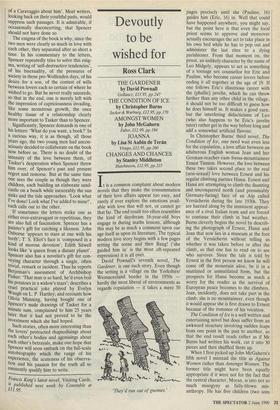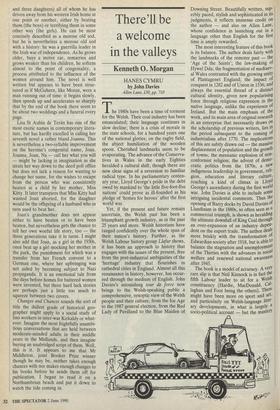Devoutly to be wished for
Ross Clark
CHANGES AND CHANCES by Stanley Middleton Hutchinson, f12.95, pp.215 It is a common complaint about modern novels that they make the consummation of their love affairs appear too easy, and rarely if ever explore the emotions avail- able with love that will not, or cannot go that far. The end result too often resembles the kind of daydream 16-year-old boys engage in during maths lessons, although this may be as much a comment upon our age itself as upon its literature. The typical modern love story begins with a few pages setting the scene and then Bang! ('she guided him in' is the most oft-repeated expression) it is all over. David Pownall's seventh novel, The Gardener, is one such story. Even though the setting is a village on the Yorkshire/ Westmoreland border in the 1950s hardly the most liberal of environments as regards copulation — it takes a mere 50 'They'd rlin Old! Of :411(1)10.. pages precisely until she (Pauline, 16) guides him (Eric, 16) in. Well that could have happened anywhere, you might say, but the point here is that even the local priest seems to approve and moreover actually encourages the act to take place in his own bed while he has to pop out and administer the last rites to a dying parishioner. From that moment on, the priest, an unlikely character by the name of Leo Midgely, appears to act as something of a teenage sex counsellor for Eric and Pauline, who become career lovers before ending it all together at the age of 19. If one follows Eric's illustrious career with the (phallic) javelin, which he can throw further than any other child in the village, it should not be too difficult to guess how he does himself in. It makes a good yarn, but the interfering didacticisms of Leo (who also happens to be Eric's javelin tutor) rather get in the way before long and add a somewhat artificial flavour.
In Christopher Burns' third novel, The Condition of Ice, one need wait even less for the copulation, a love affair between an adulterous English woman Jean and her German-teacher-cum-Swiss-mountaineer Ernest Tinnion. However, the love between these two takes second place to the real (non-sexual) love between Ernest and his regular climbing partner Hansi. Ernest and Hansi are attempting to climb the daunting and unconquered north (and presumably Germany-facing) face of an Alp called Versiicherin during the late 1930s. They are hurried along by the imminent appear- ance of a rival Italian team and are forced to continue their climb in bad weather. Burns cleverly begins the novel by describ- ing the photograph of Ernest, Hansi and Jean that now lies in a museum at the foot of the Versiicherin without telling us whether it was taken before or after the climb, so that one has to read on to see who survives. Since the tale is told by Ernest in the first person we know he will come off the mountain alive, be it in a mutilated or unmutilated form, but the prospects for Hansi become as much a worry for the reader as the survival of European peace becomes to the climbers. Jean, incidently, does not take part in the climb; she is no mountaineer, even though it would appear she is first drawn to Ernest because of the romance of his vocation.
The Condition of Ice is a well written and entertaining novel but does suffer from an awkward structure involving sudden leaps from one point in the past to another, so that the end result reads rather as if Mr Burns had written his work, cut it into 30 pieces and then shuffled them up.
When I first picked up John McGahern's fifth novel I misread the title as Against Women rather than Amongst Women. The former title might have been equally appropriate if it were not for the fact that the central character, Moran, is into not so much misogyny as fully-blown mis- anthropy. He has five children (two sons and three daughters) all of whom he has driven away from his western Irish home at one point or another, either by beating them (the boys) or terrifying them in some other way (the girls). He can be most concisely described as a morose old sod, but he is nevertheless a morose old sod with a history: he was a guerrilla leader in the Irish war of independence. As he grows older, buys a motor car, remarries and grows weaker than his children, he softens almost to the point of congeniality, a process attributed to the influence of the women around him. The novel is well written but appears to have been struc- tured as if McGahern, like Moran, were a man running out of time: it begins slowly, then speeds up and accelerates so sharply that by the end of the book there seem to be about two weddings and a funeral every page.
Lisa St Aubin de Teran has one of the most exotic names in contemporary litera- ture, but has hardly excelled in calling her seventh novel a rather bland Joanna. This is nevertheless a two-syllable improvement on the heroine's congenital name, Joan. Joanna, Joan, Na — call her what you will — might be lacking in imagination as she struts her way down to the deed poll office but does not lack a reason for wanting to change her name, for she wishes to escape from the person who was consistently beaten as a child by her mother, Miss Kitty. It later transpires that Miss Kitty had wanted Joan aborted, for the daughter would be the offspring of a husband who in turn used to beat her.
Joan's grandmother does not appear either to have beaten or to have been beaten, but nevertheless gets the chance to tell her own woeful life story, too — the three generations take it in turns. I might also add that Joan, as a girl in the 1930s, once beat up a girl mocking her mother in the park, the punishment for which was a transfer from her French convent to a German one, where her upbringing was not aided by becoming subject to Nazi propaganda. It is an emotional tale from the days before homes for battered women were invented, but three hard luck stories are perhaps just a little too much to squeeze between two covers.
Changes and Chances sounds the sort of title the dullest grade of historical geo- grapher might apply to a social study of lino workers in inter-war Kirkaldy or what- ever. Imagine the most frightfully unambi- tious conversations that are held between moderate-minded adults in their middle years in the Midlands, and then imagine buying an unabridged script of them. Well, this is it. It appears to me that Mr Middleton, joint Booker Prize winner though he may be, neither takes enough chances with nor makes enough changes to his books before he sends them off for publication. I began to read it on a Northumbrian beach and put it down to watch the tide coming in.



















































 Previous page
Previous page